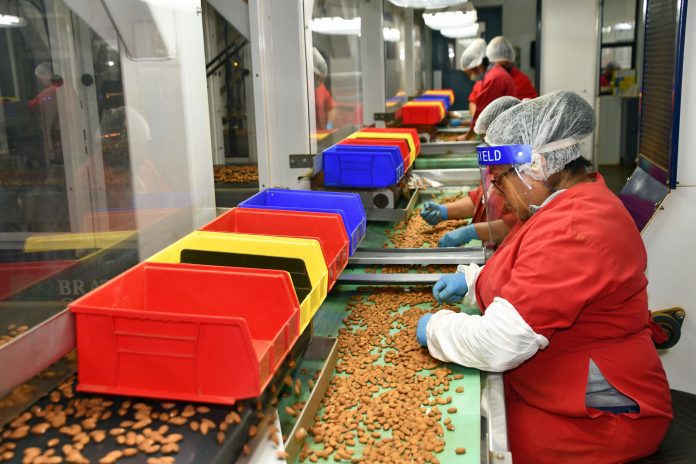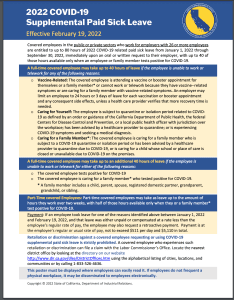
Over the past few months, the State of California has been working to lengthen COVID-19 protections for employees to the end of 2022 and beyond. In September, Governor Newsom signed AB 152 and AB 1751, which extended Supplemental Paid Sick Leave and the workers’ compensation presumption for COVID-19. Additionally, the California’s Occupational Safety and Health Standards Board is currently working through the rule making process to establish a non-emergency COVID-19 standard. This article will provide employers with regulatory updates and help to ensure you are in compliance.
AB 152 | COVID-19 Supplemental Paid Sick Leave
COVID-19 Supplemental Paid Sick Leave (SPSL) was officially extended to December 31, 2022 with the signing of AB 152. This regulation extends the requirement of employers with 26 or more employees to provide any unused SPSL to their employees until December 31, 2022. This regulation did not expand the amount of time allocated for employees under the parameters set earlier this year.
Just a reminder—the 2022 COVID-19 SPSL provides for two separate banks of leave, each of up to 40 hours. The first bank of COVID-19 Supplemental Paid Sick Leave, up to 40 hours, is available to covered employees unable to work or telework due to any one of the following reasons:
Caring for Yourself: The covered employee is subject to a quarantine or isolation period related to COVID-19 (see note below) or has been advised by a healthcare provider to quarantine due to COVID-19, or is experiencing symptoms of COVID-19 and seeking a medical diagnosis.
Caring for a Family Member: The covered employee is caring for a family member who is either subject to a quarantine or isolation period related to COVID-19 or has been advised by a healthcare provider to quarantine due to COVID-19, or the employee is caring for a child whose school or place of care is closed or unavailable due to COVID-19 on the premises.
Vaccine-Related: The covered employee or a qualifying family member is attending a vaccine appointment or cannot work or telework due to vaccine-related side effects.
The second bank of COVID-19 Supplemental Paid Sick Leave, up to 40 hours, is available only if an employee or a family member for whom they are providing care tested positive for COVID-19.
As a result, covered employees can receive up to 40 hours of each type of leave, for a maximum of 80 SPSL hours. However, if they have used all 80 hours, there are no additional hours provided by this legislation, and the employee would need to utilize sick time, vacation time or choose to have unpaid time off if they are unable to work. Employees and employers should communicate to determine a course of action.
Additionally, AB 152 modified the required SPSL for employees who fail to submit employer required COVID-19 testing which is allowed only under the second bank of time. The 2022 COVID-19 SPSL law provides that an employer may require a test after five days have passed since the employee tested positive for COVID-19. AB 152 allows the employer to require a second test after 24 hours have passed from the first required test. If the employee fails to take such a test required by the employer, the employer may deny pay for any leave taken after the time the employer provides the test. Any test required by the employer must be made available by the employer and at no cost to the employee. Making a test available means ensuring the employee has a rapid test in-hand or securing an appointment at a testing facility for the employee.
Finally, AB 152 also provides grant opportunities for employers with 26 to 49 employees. Qualifying businesses can be reimbursed for actual COVID-19 SPSL costs paid to employees in 2022. Applicants must meet the criteria set by the State of California and would be eligible to receive up to $50,000 reimbursement.

AB 1751 | Workers’ Compensation Presumption Extension
In 2020, Governor Newsom signed SB 1159, which created a rebuttable presumption that COVID-19 illnesses contracted by employees on the job are work-related and eligible for workers’ compensation, including medical treatment. Employers are required to report employee infections at a specific workplace to their workers’ compensation insurer, regardless of whether the infection appears to be work-related. However, this is a rebuttable presumption, meaning that an employer can present evidence regarding measures they have taken to reduce potential transmission of COVID-19 in the workplace. SB 1159 was scheduled to sunset in January 2023; however, AB 1751 has extended this regulation until January 2024.
Cal/OSHA Non-Emergency COVID-19 Standard
In September, the California Occupational Safety and Health Standards Board met to discuss the creation of a non-emergency COVID-19 standard. If passed, the standard would be in effect for two years and would be included in a company’s injury and illness prevention plan. The proposed standard language has evolved to allow for more flexibility in the regulation and adapt to COVID-19 changes. Below are some key points employers should know:
The requirement for exclusion pay has been eliminated in this draft version.
Employers will be responsible for adhering to California Department of Public Health and local COVID-19 orders and guidance to determine appropriate COVID-19 prevention controls. This includes providing face coverings, reporting outbreaks and close-contact exclusions.
Employers must still exclude COVID-19 cases from the workplace and notify close contacts. Remember to think about contract employees and vendors who might have been in close proximity.
If an employee was in close contact, the employer shall make COVID-19 tests available to the employee at no cost during paid time.
Employers need to continue to provide respirators (e.g., N95 masks) to employees who request them at no cost.
The proposed regulation also still contains outbreak procedures with additional COVID-19 prevention requirements.
To review the proposed regulations, please visit dir.ca.gov/oshsb.
Please note: The current COVID-19 Prevention Emergency Temporary Standard is still in effect until December 31, 2022. Ensure you continue to implement your company’s plan. If you need assistance with your COVID policies or have questions, please contact AgSafe at 209-526-4400 or send an email to safeinfo@agsafe.org.
AgSafe is a 501c3 nonprofit providing training, education, outreach and tools in the areas of safety, labor relations, pesticide compliance and human resources for the agricultural community. Since 1991, AgSafe has educated over 100,000 employers, supervisors and workers about these critical issues.
Information on COVID-19 SPSL was generously provided by Patrick Moody, Barsamian and Moody.










